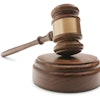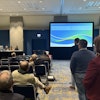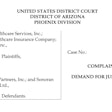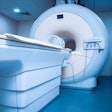
If a patient commits suicide after receiving imaging exam results he or she perceives to be bad news, could the radiologist be held responsible? It's a compelling question, and one radiologists need to consider as patients gain increasing access to radiology reports through online portals or even direct mail, according to a commentary published online November 3 in the American Journal of Roentgenology.
It hasn't happened yet in the U.S., but a recent case in Israel offers a cautionary tale, wrote lead author Dr. Leonard Berlin from Rush Medical College and the University of Illinois College of Medicine, along with Dr. Jacob Sosna and Dr. Dan Halevy, both of Hadassah Hospital in Jerusalem. Their commentary describes a lawsuit in which the radiologist was found negligent in the case of a psychiatric patient who committed suicide after reading a radiology report mailed directly to him.
"Although the lawsuit and its outcome do not influence laws in the United States ... it should stimulate the radiologic community into giving serious thought to the format and manner in which reports of radiologic examinations are communicated to patients," the three wrote.
The case
In 2015, a 51-year-old man living in Haifa, Israel, was diagnosed with lung cancer. He underwent surgery, followed by a PET/CT scan that found no metastatic disease; he also underwent radiation treatment. During the course of radiation, he became depressed and was treated by a psychiatrist, who prescribed antidepressant medication. At his six-month follow-up, the man had another PET/CT scan, which showed that "the pathologic uptake in the mediastinum had decreased markedly" (AJR, November 3, 2016).
He received the radiology report two days later, which he opened and read. The report stated: "Pathological uptake in a mediastinal lymph node, less prominent than before." The man became upset, saying to his wife, "You told me that I am healthy." In the morning, his wife found his body hanging from a tree in their backyard.
She filed a malpractice suit against the hospital, alleging that because the radiologist and oncologist were aware that her husband was being treated for depression, they had acted negligently by sending the radiology report directly to him.
The suit went to a bench trial, conducted before a single judge. The woman's attorney claimed that her husband had committed suicide because the radiology report was mailed to his house, and due to his fragile mental state, he perceived the report to mean that his cancer had gotten worse. Her attorney argued that the radiology report results should have been considered bad news and handled with caution; the defense argued that the results were not bad news.
In the end, the judge found for the plaintiff and awarded $400,000 in damages, stating that "the defendant had the means to apply simple safety measures in order to prevent the suicide ... of the deceased. The defendant could have sent the results directly to the referring physician, or by instructing the deceased to open the envelope containing the report only in the presence of the referring physician who would be able to explain the clinical implications of the results of the report."
Could it happen in the U.S.?
The question of whether patients should have direct access to their radiology reports has been debated in the U.S. for years, Berlin and colleagues wrote. Current law allows patients to request access to laboratory reports; earlier this year, the Obama administration published guidelines that require physicians and hospitals to provide patients with copies of their medical records within 30 days after receiving a request.
It's patient access to the radiology report that makes this case unusual, according to the authors. Most medical malpractice cases hinge on the question of whether a physician caused direct physical injury to the patient, they wrote. But in this case, the physician was accused of aggravating a pre-existing mental condition that led to the patient's death by sending imaging results directly to the patient -- and courts have begun to recognize mental and emotional distress as being just as real as physical pain.
So could U.S. radiologists be found negligent in a similar situation?
"Inasmuch as no such lawsuit has yet been filed in the United States, a definite yes or no answer cannot be given, but a yes answer is plausible," Berlin and colleagues wrote.
The fact is that more and more patients will be reading their imaging exam reports, and radiologists need to be aware of this, they wrote. It's important to adjust standard report templates when necessary and proofread the report before it goes out to the patient -- or a "good news" report may be misconstrued as a "bad news" report, Berlin told AuntMinnie.com.
"We have to remember that every report we render could conceivably be seen by a patient -- and not necessarily with the benefit of context provided by a referring physician or radiologist," he said.




















